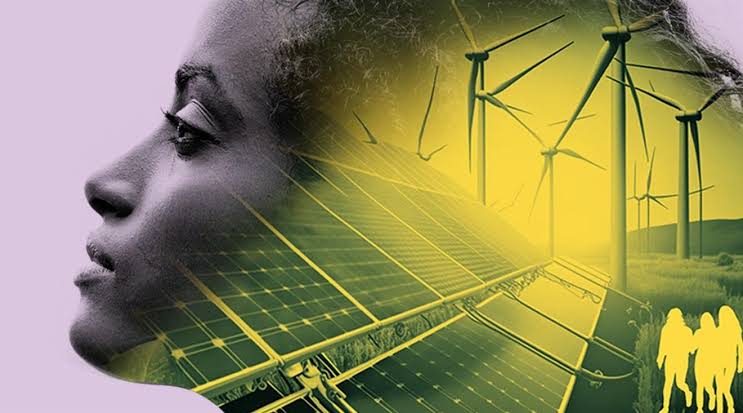Green jobs and the problem of gender disparity

- 06 Mar 2024
Why is it in the News?
Increasing women’s representation in green jobs will lead to benefits such as boosting a low-carbon and environmentally sustainable economy
Context:
- The worldwide movement towards low-carbon development presents India with a distinctive opportunity for progress.
- Nevertheless, this transition brings forth a gender disparity challenge, as men tend to transition to green jobs more rapidly than women.
- Hence, it's crucial to delve into the gender aspects of India's green transition, highlighting the imperative for women's empowerment and gender equality in climate initiatives.
What are Green Jobs?
- Green jobs represent a category of employment directly benefiting the planet and contributing to overall environmental well-being.
- These roles are geared towards mitigating the negative environmental impact of various economic sectors and advancing the creation of a low-carbon economy.
- Occupations involving renewable energy, resource conservation, and the promotion of energy-efficient practices fall under this umbrella.
- The International Labour Organization characterizes green jobs as 'decent jobs that contribute to the preservation or restoration of the environment.'
- They encompass diverse sectors such as manufacturing, construction, renewable energy, energy efficiency, and automobiles, historically characterized by lower female representation.
Gender Disparity in Green Jobs:
- Globally, men tend to transition to green jobs at a faster pace than women.
- Despite India's significant increase in renewable energy capacity by 250% between 2015 and 2021, women constitute only 11% of workers in the solar rooftop sector.
- The Annual Survey of Industries 2019-20 reveals that women workers are predominantly concentrated in industries like apparel, textile, leather, food, and tobacco.
- According to a Confederation of Indian Industry (CII) 2019 report, men make up 85% of the workforce in sectors such as infrastructure, transport, construction, and manufacturing.
- A 2023 study by the Skill Council for Green Jobs indicated that 85% of green skills training was provided to men, with over 90% of women expressing belief that social norms hinder their participation in such training.
- Restrictive social norms contributing to this disparity include perceptions that women are unsuitable for certain technical roles, safety concerns, lower representation in science, technology, engineering, and mathematics (STEM) subjects, and familial constraints.
Advantages of Women's Engagement in Green Jobs:
- Addressing Gender Bias in the Labour Market: Increased representation of women in green jobs acts as a potent remedy to entrenched gender biases in the labor market.
- By entering traditionally male-dominated sectors like manufacturing, construction, and renewable energy, women challenge stereotypes and reshape societal perceptions of gender roles.
- Expanded Economic Opportunities: Women's greater involvement in green jobs opens up expanded economic avenues for them.
- Participation in sectors such as renewable energy and energy efficiency enables women to access high-growth industries, fostering both economic growth and personal financial stability.
- Beyond economic benefits, engagement in green jobs offers opportunities for women's advancement in technical and social spheres, exposing them to innovative technologies, sustainable practices, and networking opportunities.
- Empowerment of Women's Agency: The transition to green jobs empowers women by granting them agency over their economic destinies.
- In roles contributing to environmental preservation or restoration, women find alignment with a broader sense of purpose, fostering a deeper connection to their work and its societal impact.
- Contribution to Long-Term Gender Empowerment: Participation in green jobs extends beyond immediate economic gains, contributing to the enduring empowerment of women.
- By breaking into historically imbalanced sectors, women pave the way for future generations, inspiring young girls to pursue careers in STEM fields.
- Promotion of Environmental Stewardship: Women's involvement in green jobs resonates with their recognized role as custodians of the environment.
- With a nuanced understanding of the interconnectedness of social and ecological systems, women offer unique perspectives to the development and implementation of sustainable practices within green industries.
Way Forward:
- Addressing Data Gaps: Rectifying the lack of data is imperative to understand the landscape of women's participation in green jobs in India.
- Initiatives should focus on mapping emerging areas for green growth and collecting sex-disaggregated data on green jobs to enhance women's engagement.
- Conducting gender analysis, gathering gender statistics through periodic labor force surveys, and mobilizing additional resources can shed light on the present and future impact of low-carbon transitions on women workers and entrepreneurs.
- Supporting Women Entrepreneurs: Gender-targeted financial policies and products tailored to the needs of women entrepreneurs can catalyze their entry into the green transition market.
- Measures such as collateral-free lending, financial literacy training, and establishing supportive networks are crucial to unlock their potential.
- Developing appropriate tools to assess creditworthiness, facilitate loan disbursement, and reduce operational costs for women-owned businesses is essential.
- Promoting a Gender-Just Transition: A comprehensive strategy for a gender-just transition encompasses employment, social protection, reduction of care work burden, and skill development.
- Collaboration among government, private sectors, and stakeholders is essential to harness innovation, technology, and finance for women entrepreneurs and workers.
- Businesses must prioritize gender justice to mitigate barriers and promote equitable job opportunities for a fair transition.
Conclusion
As India navigates its green transition, prioritizing women's empowerment and gender equity in climate actions is essential for unlocking the co-benefits of a low-carbon and environmentally sustainable economy. Bridging the gender gap in green jobs requires concerted efforts to address social norms, collect gender-disaggregated data, and implement inclusive policies. This is not only an economic imperative but a crucial step towards building a socially equitable and inclusive future for all.
